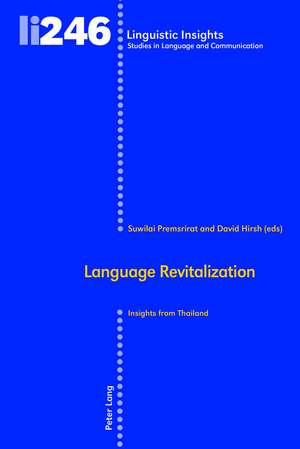Language Revitalization: Linguistic Insights
en Hardback – 26 iul 2018
Din seria Linguistic Insights
- 8%
 Preț: 557.00 lei
Preț: 557.00 lei -
 Preț: 368.75 lei
Preț: 368.75 lei - 23%
 Preț: 533.49 lei
Preț: 533.49 lei - 19%
 Preț: 681.40 lei
Preț: 681.40 lei - 19%
 Preț: 708.58 lei
Preț: 708.58 lei - 23%
 Preț: 546.27 lei
Preț: 546.27 lei - 23%
 Preț: 444.38 lei
Preț: 444.38 lei - 27%
 Preț: 737.56 lei
Preț: 737.56 lei - 23%
 Preț: 593.07 lei
Preț: 593.07 lei - 27%
 Preț: 774.54 lei
Preț: 774.54 lei - 23%
 Preț: 482.18 lei
Preț: 482.18 lei - 23%
 Preț: 643.93 lei
Preț: 643.93 lei - 5%
 Preț: 852.77 lei
Preț: 852.77 lei - 27%
 Preț: 683.28 lei
Preț: 683.28 lei - 23%
 Preț: 591.34 lei
Preț: 591.34 lei - 23%
 Preț: 665.50 lei
Preț: 665.50 lei - 23%
 Preț: 530.52 lei
Preț: 530.52 lei - 23%
 Preț: 490.78 lei
Preț: 490.78 lei - 27%
 Preț: 823.06 lei
Preț: 823.06 lei - 23%
 Preț: 574.65 lei
Preț: 574.65 lei - 23%
 Preț: 654.71 lei
Preț: 654.71 lei - 23%
 Preț: 429.52 lei
Preț: 429.52 lei -
 Preț: 500.02 lei
Preț: 500.02 lei - 23%
 Preț: 479.79 lei
Preț: 479.79 lei - 23%
 Preț: 687.19 lei
Preț: 687.19 lei - 8%
 Preț: 480.80 lei
Preț: 480.80 lei - 23%
 Preț: 707.35 lei
Preț: 707.35 lei - 5%
 Preț: 550.42 lei
Preț: 550.42 lei - 23%
 Preț: 528.48 lei
Preț: 528.48 lei - 23%
 Preț: 557.55 lei
Preț: 557.55 lei - 23%
 Preț: 601.88 lei
Preț: 601.88 lei - 23%
 Preț: 548.04 lei
Preț: 548.04 lei - 23%
 Preț: 603.19 lei
Preț: 603.19 lei - 27%
 Preț: 689.73 lei
Preț: 689.73 lei - 27%
 Preț: 687.20 lei
Preț: 687.20 lei - 27%
 Preț: 703.94 lei
Preț: 703.94 lei - 23%
 Preț: 425.22 lei
Preț: 425.22 lei - 27%
 Preț: 683.56 lei
Preț: 683.56 lei - 23%
 Preț: 432.92 lei
Preț: 432.92 lei - 5%
 Preț: 815.42 lei
Preț: 815.42 lei - 23%
 Preț: 640.17 lei
Preț: 640.17 lei - 23%
 Preț: 440.19 lei
Preț: 440.19 lei - 8%
 Preț: 432.17 lei
Preț: 432.17 lei - 23%
 Preț: 502.07 lei
Preț: 502.07 lei - 20%
 Preț: 548.80 lei
Preț: 548.80 lei -
 Preț: 527.17 lei
Preț: 527.17 lei - 23%
 Preț: 624.74 lei
Preț: 624.74 lei - 23%
 Preț: 619.83 lei
Preț: 619.83 lei - 23%
 Preț: 446.85 lei
Preț: 446.85 lei
Preț: 683.80 lei
Preț vechi: 844.20 lei
-19% Nou
Puncte Express: 1026
Preț estimativ în valută:
130.86€ • 142.10$ • 109.92£
130.86€ • 142.10$ • 109.92£
Carte tipărită la comandă
Livrare economică 22 aprilie-06 mai
Preluare comenzi: 021 569.72.76
Specificații
ISBN-13: 9783034334976
ISBN-10: 3034334974
Pagini: 306
Dimensiuni: 156 x 231 x 25 mm
Greutate: 0.48 kg
Ediția:Nouă
Editura: Peter Lang Copyright AG
Seria Linguistic Insights
ISBN-10: 3034334974
Pagini: 306
Dimensiuni: 156 x 231 x 25 mm
Greutate: 0.48 kg
Ediția:Nouă
Editura: Peter Lang Copyright AG
Seria Linguistic Insights
Notă biografică
Suwilai Premsrirat is Professor of Linguistics and founding director of the Resource Center for Documentation, Revitalization and Maintenance of Endangered Languages and Cultures at Research Institute for Languages and Cultures of Asia, Mahidol University, Thailand.
David Hirsh is Associate Professor of TESOL at the University of Sydney, and co-editor of the University of Sydney Papers in TESOL.
Descriere
This volume reports on programs to revitalize and maintain languages of Thailand, with a particular focus on small enclave languages and school-based revitalization programs. Issues of language status, cultural heritage and identity are explored. The book provides a framework for future developments in revitalizing Thailand's indigenous languages.
